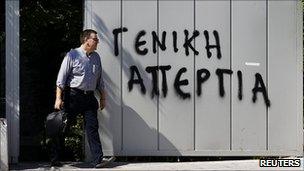Greece: Crunch parliament vote raises tension
- Published
- comments

Graffiti announces "general strike": Political instability threatens to add to Greece's woes
ATHENS Plastered across the street lights, shop fronts, and graffiti-scarred walls are the posters announcing a demonstration outside parliament at 7pm tonight.
In reality everyone in Greece knows the country is heading for a parliamentary showdown. The government of Socialist leader George Papandreou is facing a confidence vote. If it loses there will be elections - with huge implications for Greece itself and the economies of the eurozone.
For the vote tonight is not just about the quality of a recently reshuffled government. It is a hurdle the prime minister must clear. If he does he will then put a package of austerity measures to parliament next week.
Approval of that mixture of spending cuts, tax increases and privatisations is needed for the EU and IMF to release new funds to Greece. Without extra funding Greece will run out of its cash reserves next month and will default on its debts.
From polls it seems that a majority of Greeks are not prepared to accept further austerity. They have already had a year of pain, particularly in the private sector.
Many have seen their wages drop by 15%. In the past year 400,000 people have lost their jobs. Unemployment stands at 16.2%.
Industrial production has slumped 11%. The government had promised them no more cuts but, under pressure from creditors, has returned with 6.5bn euros (£5.7bn; $9.3bn) of further savings this year and 28bn euros through 2015.
The cuts include 150,000 job losses in the bloated public sector. Many Greeks believe they are caught up in a cycle of decline, imposed by outsiders.
Anxious neighbours
Both the government and the EU are involved in a game of "dare". Europe's leaders have made it clear that a Greek default would be a catastrophe, leading to banking losses elsewhere in Europe and threatening the European banking system. President Sarkozy has said - rather dramatically - that such a blow to the euro would threaten the entire European project. And yet they have served Greece with an ultimatum. If you want fresh funds both the government, the opposition and the Greek public must sign up to the austerity programme by 3 July.
It is of course a bluff. Europe's leaders are so determined to defend their single currency they will agreed to lend Greece more money whatever, rather than risk a default.
Mr Papandreou has told the Greek people that bankruptcy would be devastating for the country. Many appear to doubt him. The threat of bankruptcy may have lost its sting.
Many Greeks would choose default - and all its unknown consequences - over more years of austerity. Others believe that Greece is being forced to accept hardship to save the euro.
The first part of this drama will be played out today. A second round will follow next week.
The expectation must be that the government will survive today's vote and push through its austerity measures. And then what? Will the programme be fully implemented? Will Greece deliver 50bn euros in privatisations? Will tax evasion be rooted out? Will growth return? There must be doubts about all these questions.
Crippling debts
And then there is the long term. If Greece embraces this programme how will it reduce its debt mountain, currently standing at 340bn euros?
I met an economist in Greece the other day who had run a computer model on the economy. He had factored in a best-case scenario. Everything defied expectations. Growth at 3%. State assets fetching top dollar etc. At the end of it the debt-to-GDP ratio would still have gone up to reach 198% of GDP.
That is what is so curious about this crisis. Almost no economist believes that Greece can escape defaulting sooner rather than later.
The only advantage in managing a default in 2015 is that Europe's banks might be healthier and stronger to withstand the shock. Curious.